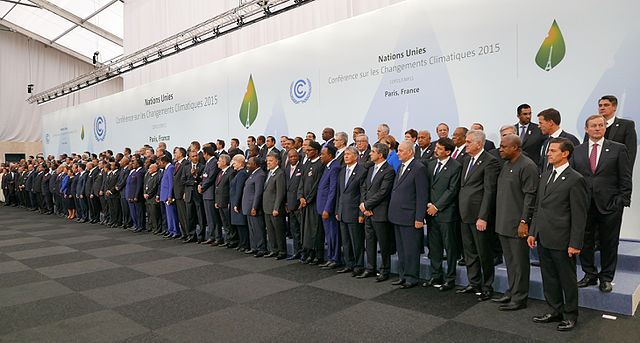Diplomacy, Distrust, and the Paris Climate Accord
Last August, David Wirth explained to Lawfare’s readers how simple it would be for President Trump to withdraw the United States from the Paris Climate Accord’s nonbinding provisions on climate emission reductions: Trump “need not go through a formal withdrawal process, as required by the Agreement and international law.

Published by The Lawfare Institute
in Cooperation With

Last August, David Wirth explained to Lawfare’s readers how simple it would be for President Trump to withdraw the United States from the Paris Climate Accord’s nonbinding provisions on climate emission reductions: Trump “need not go through a formal withdrawal process, as required by the Agreement and international law. Instead, he need only say, ‘The United States changed its mind.’” Now that President Trump might prove Wirth right, it’s worth asking what the President thinks he is achieving by announcing a national change of mind.
White House Counsel Don McGahn and EPA Administrator Scott Pruitt reportedly argue that keeping the United States’s signature on the Paris Accord would undermine the President’s regulatory reform agenda, especially the Administration’s plan to repeal or reform the Obama EPA’s immensely burdensome “Clean Power Plan” regulations, which is the subject of President Trump’s Executive Order 13783.
In response, Administration officials and other Republicans urging President Trump not to withdraw from the Paris Accord, such as Secretary of State Rex Tillerson and Senator Lisa Murkowski, argue that (in Politico’s words) “staying with the nonbinding deal would not inhibit Trump’s broader energy goals but allow the U.S. to maintain influence in international climate change negotiations and related diplomatic efforts.”
The latter argument has been echoed by many of the Paris Accord’s supporters in the Democratic and progressive ranks, as Elizabeth Kolbert recently noted in the New Yorker:
Significantly, almost no one outside the White House does accept [McGahn’s and Pruitt’s] argument. The commitments that the U.S., and indeed all countries, made under the Paris accord are known as “nationally determined contributions,” or N.D.C.s. They are not considered legally binding, an arrangement that was devised in an effort to stave off precisely the sort of debate now taking place in the White House. The State Department’s legal team disagrees with McGahn’s claim, as do most other experts on the accord. “I think what we’re clearly seeing is a political maneuver, using a spurious legal argument as a pretext for shutting off a Cabinet debate that was probably leaning towards staying in the agreement,” Paul Bodnar, the former climate chief of the White House’s National Security Council, recently told Climatewire.
Another Democratic voice making this argument is the Obama Administrator’s lead climate-policy negotiator, Todd Stern, who calls the exit option “indefensible,” and suggests that the legal arguments proffered by McGahn and Pruitt are “bogus.”
Frankly, I’m inclined to agree that the Paris Accord should not present any legitimate legal impediment to repealing the Clean Power Plan. (Indeed, one could just as easily argue that if the Paris Accord’s nonbinding targets are relevant to domestic regulatory reform, then the Accord should bolster the legal justifications for the Administration’s pro-natural-gas policies.) But that’s not the question at issue here. The question before the Trump Administration is whether judges might attempt to construe the Paris Accord as impeding Trump’s domestic regulatory agenda.
In other words, the Administration must decide whether it would incur any legal risk by remaining in the Paris Accord while repealing the EPA’s Clean Power Plan. On that point, even without knowing precisely what argument McGahn and Pruitt are presenting to their colleagues, I can think of at least one litigation-minded argument against remaining a party to the Paris Accord.
If the United States remains a party to the Paris Accord, then it will ultimately fall to federal judges to decide whether the accord has any relevance to federal domestic regulatory reforms. What would animate those judges? Well, throughout President Obama’s tenure, we often heard complaints that federal judges—especially on the important D.C. Circuit—were inappropriately “activist” in striking down the Administration’s regulatory actions, such as the SEC’s “proxy access rule,” or the IRS’s health insurance subsidies. Harvard’s Cass Sunstein and Adrian Vermeule criticized the D.C. Circuit’s conservative judges for pursuing a willfully “libertarian” version of judicial activism in matters of administrative law. Or, as the Washington Post’s Steven Pearlstein asserted, “[m]any of the D.C. Circuit judges have long since stopped pretending to defer to the factual determinations and policy judgments of duly appointed regulators, as the law requires. Deference has now given way to skepticism, hostility and contempt[.]”
We now see similar concerns being raised about the judicial response to Trump’s policies. In declaring President Trump’s executive orders on refugees, the Ninth Circuit’s reasoning and rhetoric raised eyebrows across the political spectrum. As Ben Wittes observed here, the Ninth Circuit’s hasty analysis “[r]emarkably” breezed past one of the most important statutes at issue in the dispute. Even Jeffrey Toobin, hardly a staunch Trumpist, agreed that the Ninth Circuit simply glossed over significant legal issues.
Against this backdrop of recent experience, would it be unreasonable for McGahn, Pruitt, and others to worry that the Paris Accord could serve as a convenient weapon in the hands of judges keen to push back against the EPA’s upcoming regulatory reforms?
If, for example, the EPA were to someday repeal or reform the Clean Power Plan, could the White House be absolutely confident that a panel of Ninth Circuit or D.C. Circuit judges wouldn’t decide that the EPA failed to take a sufficiently “hard look” at whether its new regulatory actions undermined the nation’s plan for achieving the goals to which nation pledged itself in Paris?
Or, could the White House be absolutely confident that those judges would not conclude that the international community’s reliance upon the U.S.’s commitment to the Paris Accord is precisely the sort of “reliance interest” which, under the Supreme Court’s explanation in FCC v. Fox, justify an exception to the usual rule of judicial deference to an agency’s policy reversals? After all, when the United States took on a leadership role in Paris, wasn’t it our stated purpose that we wanted our agreement to induce other nations to “ratchet down their dangerous carbon emissions over time”?
Todd Stern is right: judicial decisions espousing those analyses against the Trump EPA would surely be “bogus.” But bogus arguments can still create serious litigation risk, especially in the hands of a judge who is especially suspicious or hostile toward the current Administration. If McGahn, Pruitt, and Trump distrust some federal judges as much as President Obama’s proponents once did, then it would be prudent for them to minimize that litigation risk by urging President Trump to un-sign the Paris Accord.
In response to all of this, the Paris Accord’s proponents might argue in response that the benefits of remaining a party to the accord still outweigh the cost—specifically, the benefits that the United States would arguably enjoy from maintaining its leadership position in these international negotiations. This, too, is a point that Todd Stern has made publicly in his recent appeals to President Trump:
As a matter of diplomacy, withdrawing from the Paris agreement would be a stain on the legacies of both the president and Secretary of State Rex Tillerson, an act of diplomatic malpractice. Countries large and small, rich and poor, are deeply invested in Paris because they understand the peril of climate change and know the Paris agreement cannot be truly effective without U.S. engagement. They would see withdrawal as a slap in the face, disrespecting their fundamental interests and, in turn, eroding the United States’ diplomatic capital.
But this argument isn’t really a criticism of withdrawing from the Paris Accord—it’s really an argument against the substance of President Trump’s domestic regulatory agenda. This point was made bluntly by Amy Harder, the chief energy and climate writer at Axios. As Harder observed last week, President Trump has shown no interest in imitating the EU’s and Canada’s own regulatory agendas on climate. And that alone will effectively cede any U.S. “leadership” role on international climate policy, regardless of whether Trump takes the further step of un-signing the Paris Accord. As Harder, citing other nations’ actions, put it:
Much talk has been made of the potential ramifications of Trump either staying in and seeking to ratchet down the U.S. commitment to the Paris deal, or withdrawing from it altogether. The truth is, America is already giving up its leadership position. Whatever Trump does with the Paris deal will show how far back in the line of leadership he wants to go on climate.
Indeed, this was the entire point of the Paris Accord: even if its substantive provisions are nonbinding as a legal matter, the Obama Administration intended them to be “politically binding”—that is, a mechanism by which the international community could “name and shame” nations that fall short of original emissions-reduction targets.
That approach was exemplified in early 2016 by the EU’s climate change commissioner’s reaction to the U.S. Supreme Court’s order staying implementation of the Clean Power Plan: “Miguel Arias Cañete, the EU’s climate change commissioner, said: ‘We have confidence in all countries to deliver on what they promised. The EU will continue to lead by example and enshrine its targets into law.’”
And, for that matter, this tougher view of the Paris Accord was exemplified by the Obama Administration’s own climate-policy negotiator, Todd Stern, who initially trumpeted the nominally nonbinding accord as a mechanism through which nations’ emission reduction commitments “are going to keep ratcheting up, again we hope every five years.” While Stern now downplays the Paris Accord as “nonbinding,” he initially told friendly audiences that “the structure that you have these five-year review periods and the ratcheting up cycle of what countries are supposed to do built into the agreement.”
The Obama Administration and the international community understood that the ultimate point of the Paris Accord was not simply to formulate nonbinding goals for their own sake, but rather to create a framework for actually achieving those goals through domestic policy. If President Trump’s Administration follows through on his executive order by actually repealing the Clean Power Plan, then critics at home and abroad will declare that the United States has abdicated its global leadership role on climate policy regardless of whether Trump un-signs the Paris Accord; they will not give him credit for keeping America’s seat at the table if they believe that America isn’t paying its fair share of the dinner check.
In the end, if President Trump reverses President Obama’s decision to sign the Paris Climate Accord, his decision will reflect the rhetorical success of the climate accord’s own supporters. For years, these supporters argued that the Paris Climate Accord was a momentous international achievement in a generational struggle to reduce greenhouse gas emissions, and they stressed that America’s standing on the global stage would depend on future presidents delivering on President Obama’s promises. Perhaps White House Counsel McGahn and EPA Administrator Pruitt shouldn’t be mocked for worrying that hostile, activist federal judges—the kind of judges whom the Obama Administration’s supporters spent years warning about—could take the pro-Paris rhetoric seriously.





